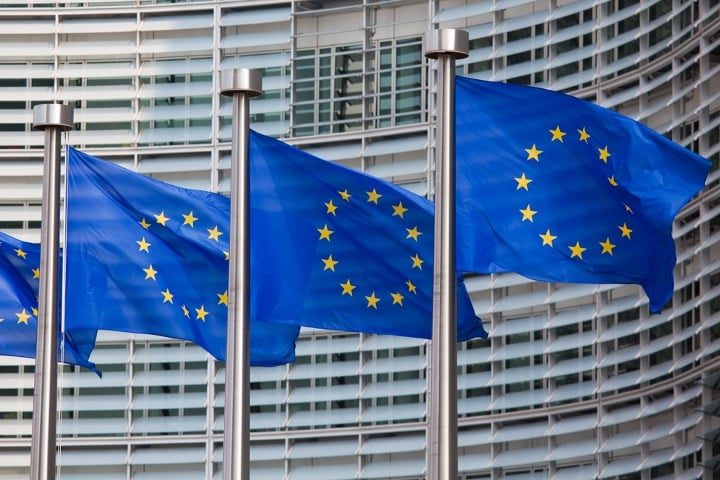
According to a new book published by French investigative journalist Charles Sapin titled Les Moissons de la Colère (Harvests of Wrath), setbacks and defeats for Ukraine could aid establishment parties within the European Union. Sapin’s claims come amid preparations for the upcoming European Parliament elections taking place June 6-9.
“If Ukraine’s position weakens, there may be a ‘rallying behind the flag effect’ more favorable to the forces in place,” he was cited as saying by Politico EU on April 1.
Notwithstanding prevalent support from the EU for the Kyiv regime in its conflict with Moscow, Sapin contended that negative developments for Ukraine on the battlefield could inadvertently bolster parties such as the European People’s Party (EPP) and the Progressive Alliance of Socialists and Democrats (S&D).
To date, most EU members have been vocal in supporting the Kyiv regime in its conflict with Moscow, sending an estimated €77 billion ($83 billion) worth of weapons, equipment, ammunition, and even cash to Kyiv.
Sapin, a reporter for the weekly Le Point, spent six years studying what he calls the “nationalist” parties that form the Identity and Democracy (ID) bloc in the European parliament — such as Hungary’s Fidesz, Portugal’s Chega, Spain’s Vox, France’s National Rally, Brothers of Italy, and the Sweden Democrats. His studies culminated in his aforementioned new book, portrayed as a deep analysis into “nationalist Europe.”
One major weakness of the parties in the ID grouping, per Sapin, is that they have different stances on the Ukraine conflict. Such a lack of cohesion, Sapin argued, renders these parties “isolated” within the political landscape of Brussels, imperiling their effectiveness in shaping EU policies.
While nationalists’ numbers might be rising, their particularism limits their effectiveness, Sapin concluded. Hence, while nationalist victories in the upcoming European Parliament election would shift the needle to the right, the EPP, currently the majority group, would stand to benefit from the situation. Additionally, the rise of nationalist parties may underscore the importance of mainstream parties and their commitment to stability and unity within the European Union, he says. Moreover, Sapin contended that parties such as Viktor Orbán’s have gained power owing to semantic and ideological acrobatics, converting “old bourgeois” voters by focusing on topics such as immigration and identity. His book encapsulates insights from various prominent European politicians, including some of Orbán’s closest political advisors, Italian Prime Minister Giorgia Meloni, and French presidential candidate Marine Le Pen.
Meanwhile, the European Public Prosecutor’s Office (EPPO) declared an investigation into the EU purchase of Covid “vaccines,” thus widening the scope of a probe into claims of wrongdoing against the European Commission led by Ursula von der Leyen.
The recently announced probe is linked to von der Leyen’s personal handling of “vaccine” orders, with particular reservations regarding her direct communications with Pfizer CEO Albert Bourla. Notably, the entire EU procurement process was plagued by waste, delays, and claims of conflict of interest.
That EPPO — the EU’s own anti-corruption agency — is taking charge of the investigation reflects poorly on von der Leyen, who in March 2024 was presented once again as the European People’s Party (EPP) candidate for the presidency of the European Commission. Already upset by her handling of the EU green deal and foreign policy, some of her centrist parliamentary faction members have rallied with external critics in publicly criticizing her track record.
Late last year, von der Leyen also made international headlines when The New York Times said it would take the European Commission to court to obtain the text messages between her and the Pfizer CEO, with the news outlet questioning how the company obtained the contract at the expense of competitor AstraZeneca. Observers questioned if the “vaccine” was fast-tracked through the regulatory process without proper due diligence measures.
In addition, von der Leyen also faced queries for her alleged lack of transparency, since the EU deal with Pfizer prompted health experts to bemoan the sheer waste of the “vaccine” procurement program, as billions worth of products were discarded because of oversupply and errors in the original contract.
While the Commission boss has some degree of partial immunity under EU law, von der Leyen and her team may face having EPPO confiscate their laptops and phones for investigations into all their electronic messaging.
In recent remarks on social media, Thierry Breton, the EU’s internal market commissioner, pointed out the lack of enthusiasm for a second term for von der Leyen from her parliamentary group.
Breton noted how von der Leyen lacked support within the EPP at its congress in Bucharest, where an endorsement for her second term as head of the EU’s executive was lackluster.
“The EPP itself does not seem to believe in its own candidate,” the commissioner mused on X.
In turn, one French official, who was granted anonymity, told Politico’s Brussels Playbook that Breton’s social media post was “a real mistake,” as it betrayed “a serious lack of political sense” and had made French President Emmanuel Macron — a vocal supporter of von der Leyen — “extremely angry.”
Two other senior party officials told Politico that Breton’s statements had provoked anger within Macron’s centrist Renaissance party, with one accusing the commissioner of “giving ammo to the EPP,” by which he presumably means its Les Républicains contingent, renowned for its skepticism of von der Leyen and her personal vision for the EU.
Notwithstanding their membership of the EPP group in Parliament, von der Leyen marks the EU’s “slide into technocracy,” and that she “has continuously left the European majority drifting towards the left,” claimed Les Républicains President Eric Ciotti in a March 5 letter to EPP boss Manfred Weber.



